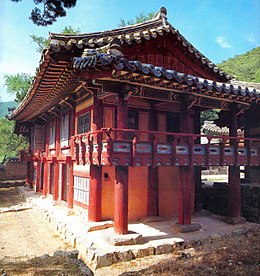Oksan Seowon, Gyeongju
| UNESCO World Heritage Site | |
|---|---|
 | |
| Location | Oksan-ri, Angang-eup, Gyeongju, North Gyeongsang Province, South Korea |
| Part of | "Yangdong Cluster: Oksanseowon Confucian Academy, Dongnakdang House" part of Historic Villages of Korea: Hahoe and Yangdong |
| Criteria | Cultural: (iii), (iv) |
| Reference | 1324-004 |
| Inscription | 2010 (34th Session) |
| Coordinates | 36°0′43″N 129°9′49″E / 36.01194°N 129.16361°E |
| Official name | Oksan-seowon |
| Part of | Seowon, Korean Neo-Confucian Academies |
| Criteria | Cultural: (iii) |
| Reference | 1498-003 |
| Inscription | 2019 (43rd Session) |
| Area | 6.44 ha (15.9 acres) |
| Buffer zone | 80.83 ha (199.7 acres) |
| Korean name | |
| Hangul | 옥산서원 |
| Hanja | 玉山書院 |
| Revised Romanization | Oksan Seowon |
| McCune–Reischauer | Oksan Sŏwŏn |
The Oksan Seowon is a seowon located at Oksan-ri, Angang-eup in the city of Gyeongju, North Gyeongsang Province, South Korea.[1] Seowon is a type of local academy during the Joseon Dynasty (1392–1897). It was established by Yi Je-min, (李齊閔), the minister of Gyeongju and local Confucian scholars in 1572, the fifth year of King Seonjo's reign, to commemorate the scholarly achievement and virtue of Confucian scholar and politician Yi Eon-jeok (1491–1553).[2][3]
Hoejae Yeongjeok left office and built the main building as the main building in the stream of Oksan in Gyeongju's Angang-eup near Yangdong Village. For this reason, after Hoejae died, Oksan Seowon was built near Dokrakdang. Oksan Seowon is located in Seshimdae, and it means to wash one's mind with water falling from Yongchu and seek learning through nature.[4]
See also
[edit]References
[edit]- ^ "Seowon, Confucian Academies of Korea". UNESCO. Retrieved 16 June 2022.
- ^ Martin Robinson, Ray Bartlett, Rob Whyte ( 2007) "Korea" Lonely Planet, ISBN 1-74104-558-4 pp.208-209
- ^ (in Korean) 옥산서원 玉山書院 Nate / EncyKorea
- ^ Oksan Seowon
External links
[edit]- (in Korean) 옥산서원 (玉山書院) at Yesullo

